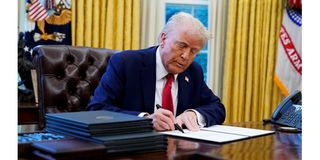Trump issues executive order against South Africa over land seizures, foreign policy stance

U.S. President Donald Trump signs a document, at the White House, in Washington, U.S. February 3, 2025. | Photo Credit: Reuters
What you need to know:
- The White House condemned the legislation as part of a wider pattern of discrimination against minority groups in South Africa, citing policies that have eroded equal opportunities in employment, education, and business.
In a statement released on 7 February 2025, the White House announced an executive order suspending all US foreign aid to South Africa while prioritising the resettlement of Afrikaner refugees fleeing government-backed land expropriation.
This follows the passage of the Expropriation Act 13 of 2024, which allows the South African government to seize agricultural land from ethnic minority Afrikaners without compensation.
The White House condemned the legislation as part of a wider pattern of discrimination against minority groups in South Africa, citing policies that have eroded equal opportunities in employment, education, and business.
The statement also criticised Pretoria’s foreign policy positions, particularly its legal action at the International Court of Justice (ICJ), where it accused Israel—rather than Hamas—of genocide, and its growing diplomatic and military cooperation with Iran.
As part of the executive order, all US government agencies, including the United States Agency for International Development (USAID), have been instructed to halt financial assistance to South Africa, except in cases where humanitarian aid is deemed essential. Additionally, the US Department of State and the Department of Homeland Security will prioritise the resettlement of Afrikaners facing state-sanctioned discrimination, including forced land seizures.
The White House justified these measures by stating that the United States could not support a government engaging in human rights violations while also undermining US foreign policy and national security interests.
The decision is expected to further strain diplomatic relations between Washington and Pretoria, particularly as South Africa continues to strengthen its alliances within BRICS, notably with Russia, China, and Iran.
Analysts predict that South Africa may respond with countermeasures, possibly by deepening its economic ties with alternative international partners.
The executive order marks a significant shift in US foreign policy towards Africa, highlighting Washington’s intent to take a firmer stance on human rights issues and geopolitical realignments.





